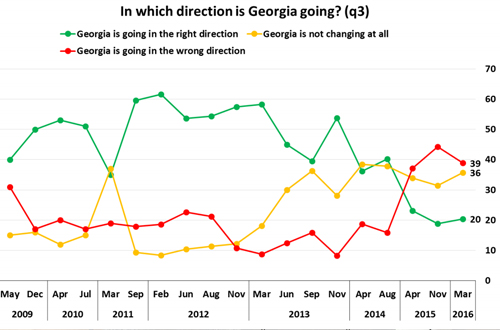
Source: NDI/CRRC public opinion survey, March, 2016
U.S. National Democratic Institute (NDI) released its commissioned public opinion survey, fielded by CRRC between February 23 and March 14, which shows respondents’ attitudes towards broad range of issues, among them economy and foreign policy.
According to the survey, 39% of respondents believe that Georgia is going in the “wrong direction”, a six percentage point decline compared to November, 2015 poll, but slightly higher than in April, 2015 (37%).
20% said the country is going in the “right direction”, up from 18% in November, but down by three percentage points compared to April, 2015. 36% think that Georgia is “not changing at all”, according to the new survey.
Only 3% of respondents think that Georgia’s economy is either in good or very good shape and 66% evaluate economic situation as either bad or very bad. 29% assessed it as “average.” An overwhelming number of those who think that country’s economy is in a bad shape blames the current government (81%), the previous government (59%), and the global economy (53%) for economic problems.
4% of respondents said that depreciation of the Georgian national currency lari (GEL) did not affect them; 56% said that it made them spend more on the things they need and 40% said they buy less things than they need as a result of weakened lari.
At the time when the survey was fielded, GEL was hovering around 2.48-2.45 per U.S. dollar, about 41% weaker than in early November 2014, when lari started depreciation. Over the past month GEL gained about 7% against U.S. dollar, but it is roughly 30% weaker compared to November, 2014.
Source: NDI/CRRC public opinion survey, March, 2016
10% of respondents described their household situation as “better off” since October 2012, while number of those who think that they are “worse off” increased from 34% in April 2015 to 42% in the new survey; 47% said it remained the same.
48% thinks that economic situation will remain the same in next twelve months; 20% believes it will improve and 17% thinks it will get worse, according to the survey, which was carried out about seven months before the parliamentary elections, scheduled for October 8.
“Affordable healthcare” was the only area in the list of issues, where the majority of respondents (51%) think situation has changed for better since October, 2012.
Jobs (57%), rising prices (35%), poverty (30%), and pensions (26%) were ranked as the most pressing issues. Territorial integrity (23%) was down further to the fifth place in this list, according to the survey.
Foreign Policy
Source: NDI/CRRC public opinion survey, March, 2016
When choosing between the European Union and the Russian-led Eurasian Union, support for the EU has increased from 58% in November to 61% in March. 20%, down from 24% in November, chose the Eurasian Union.
68% of respondents said they approve government’s stated goal to join NATO, which is statistically almost the same level recorded in November, 2015.
Source: NDI/CRRC public opinion survey, March, 2016
On question what should be Georgia’s foreign policy, 52% chose the answer: “pro-Western, however, we should maintain good relations with Russia”, and 14% responded: “pro-Western.”
On the same question, 16% responded: “pro-Russian, however, we should maintain good relations with EU and NATO”, and 5% chose the answer: “pro-Russian”.
Source: NDI/CRRC public opinion survey, March, 2016
84% of respondents approve the European Commission’s positive report on Georgia’s visa liberalization and 72% believe visa waiver for the Georgian citizens in the Schengen area will have a beneficial impact on them.
Asked which country or organization poses the biggest threat to Georgia, 47% of respondents named Russia, followed by the Islamic State group (8%); the United States (7%); Turkey (5%); NATO (2); 27% responded that they did not know.
The survey was conducted through nationwide face-to-face interview with 3,900 respondents and it has a margin of error plus, minus 1.6%.
Another part of the same survey, involving political ratings, will be released on April 13.
This post is also available in: ქართული (Georgian) Русский (Russian)
